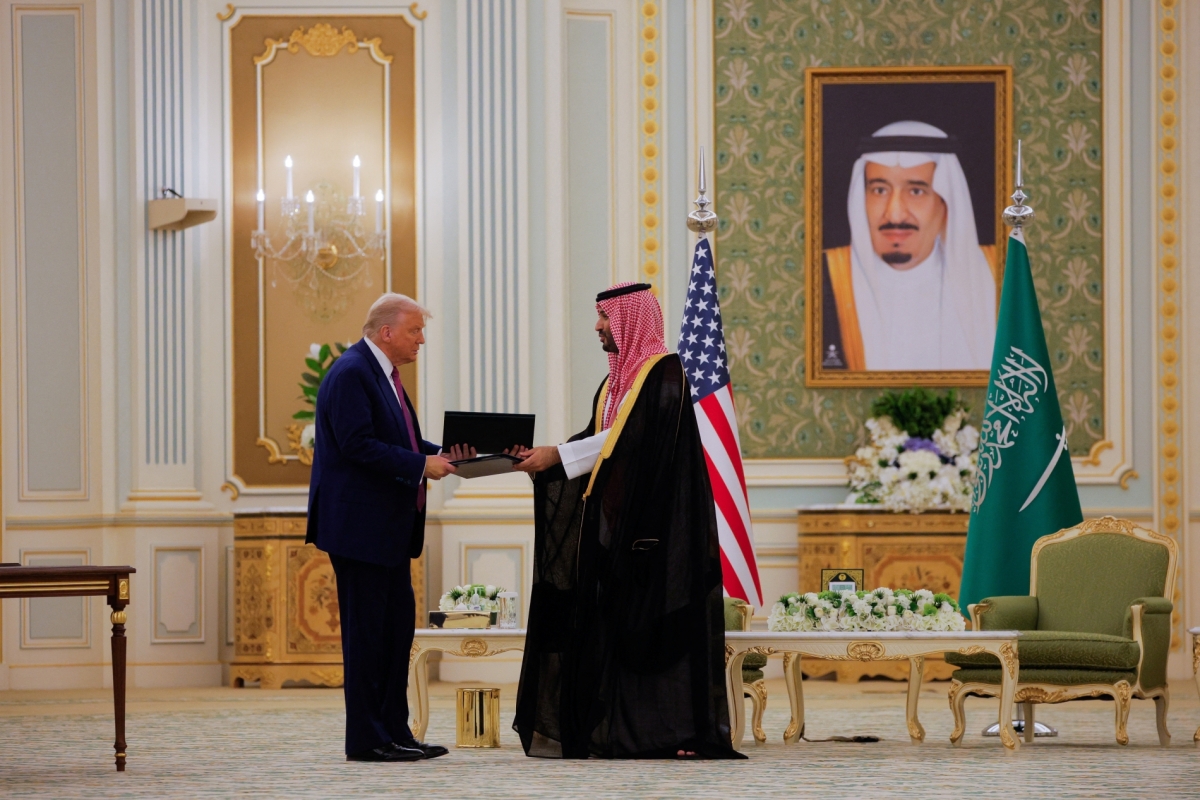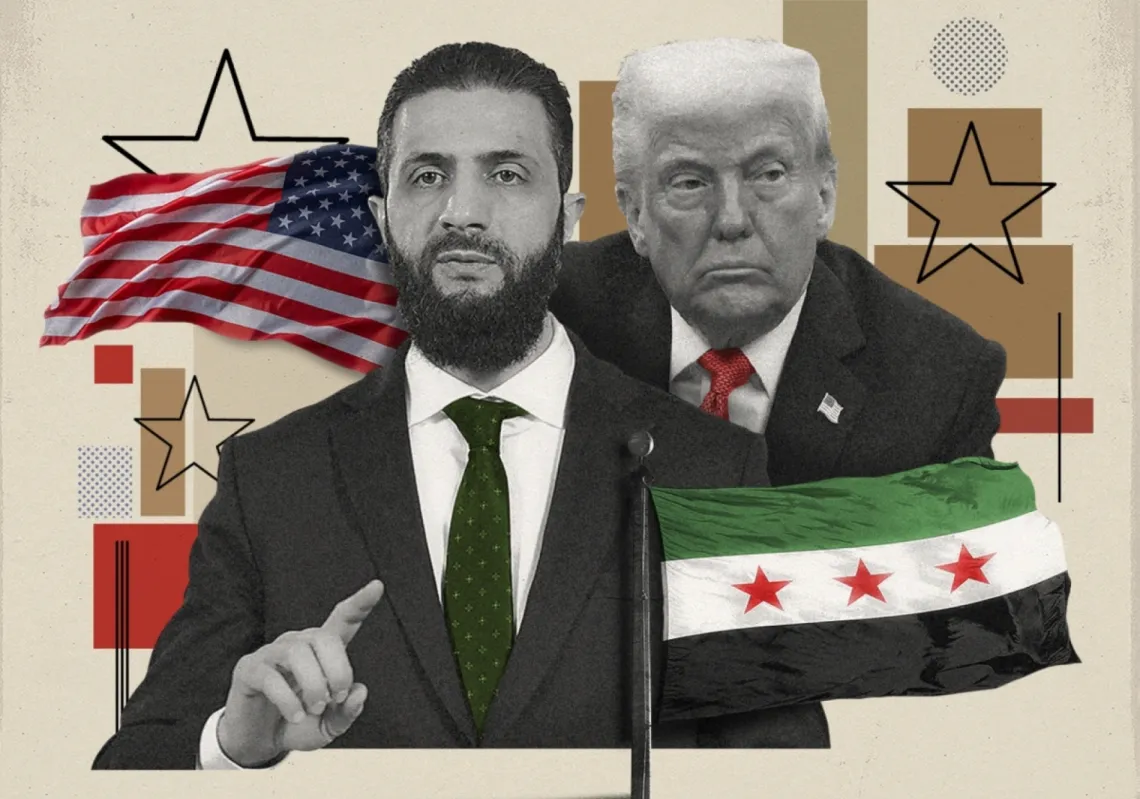The United States and Saudi Arabia ushered in what President Donald Trump described as a "new golden era of partnership,’ built on multi-billion-dollar deals in defence and AI technology. In what the White House described as “the largest military sales contract in history”, the two countries clinched a $142bn deal to upgrade Saudi Arabia’s air force, military and communication systems.
The other landmark agreement was the supply of advanced AI chips made by Nvidia to Humain, the company Crown Prince Mohammed bin Salman tasked to make Saudi Arabia a global leader in artificial intelligence, by leveraging its affordable energy supply to power data and research centres. Trump’s crypto and AI czar, David Sacks, announced ending the restrictions on export control restrictions implemented under the Biden administration in Riyadh at the Saudi-US Investment Forum.
Trump told the forum the deals were worth $600bn, while Crown Prince Mohammed bin Salman put the figure at $300bn, with the possibility of raising it to $600bn and even $1tn.
'Historic and transformative' deals
“The deals celebrated today are historic and transformative for both countries and represent a new golden era of partnership between the United States and Saudi Arabia,’’ Trump said in a statement released by the White House. After Saudi Arabia, he is due to visit Qatar and the United Arab Emirates.
Parallels were drawn between Trump's visit to Riyadh and the historic meeting between the kingdom's founding father, King Abdulaziz, and President Franklin D. Roosevelt on board the USS Quincy, in the Suez Canal, 80 years ago. However, two key differences set them apart.
The first is that China is now the main adversary of the United States, not the Soviet Union, which collapsed in 1991. And the second is that Saudi Arabia is moving to diversify its economy away from oil, the resource that was at the heart of their economic cooperation in the 20th century, when Saudi Arabia became the top crude exporter and the Middle East's largest economy.

The agreements appear to help the US in two ways: secure funding to expand Open AI, Alphabet, Meta and xAI data centres and research, and reduce China’s technological appeal for Saudi Arabia.
“This evolution presents an opportunity for US engagement; Saudi capital and scale offer a counterweight to China,” said Wael Mahdi, the CEO of Saudi advisory firm Elevare360, and author of the book “OPEC in a Shale World.”
The weight of the US delegation was reflected by the number and calibre of American financial, technological, and industrial firms in attendance: Nvidia, IBM, Qualcomm, Alphabet, BlackRock, Citi, Blackstone, and Franklin Templeton. Elon Musk, the Tesla and SpaceX CEO tasked by Trump to lead the Department of Government Efficiency, was also a notable guest.
Addressing Musk as a "dear friend", Communications and Information Technology Minister Abdullah Alswaha, said: "We’re honoured to have President Trump under the sponsorship and guidance of his royal highness, to celebrate the US-Saudi and Saudi-US relationship, (and talk) about how we move from an oil-based economy to an innovation-based economy, powered by wonderful technology that you’re definitely one of the pioneers of."
The economic transformation to diversify the economy away from oil, by developing tourism, technology, logistics, sports, and the financial industries, is the goal of the crown prince’s Vision 2030, unveiled nine years ago, which also enacted measures to empower women.
Saudi Finance Minister Mohammed Al-Jadaan highlighted at the forum the increased participation of Saudi women in the workforce, which doubled to 36%, from 17% before the launch of Vision 2030. “Keep going, ladies!,’’ said Citi CEO Jane Fraser.
Syria sanctions lifted
On the political front, Saudi Arabia scored a political win by helping convince Trump to end US sanctions on Syria, in an announcement that the crown prince and the audience celebrated with a standing ovation.
"I will be ordering the cessation of sanctions against Syria, in order to give them a chance at greatness," Trump told the Saudi-US Investment Forum, adding that he made the decision at the request of the Saudi crown prince and also Turkish President Tayyip Erdogan, "Good luck Syria, show us something very special."
Following the announcement, Syrian President Ahmed al-Sharaa flew to Saudi Arabia, where he met Trump in person, the first such meeting between an American and Syrian president in more than 20 years.
Read more: From Nixon to Clinton: Syrian-American summits since 1945
Deals at a glance
- $142bn in defence sales contracts from over a dozen US firms
- Saudi Arabian DataVolt is moving forward with plans to invest $20bn in AI data centres and energy infrastructure in the United States
- Google, DataVolt, Oracle, Salesforce, AMD, and Uber are committing to invest $80bn in cutting-edge transformative technologies in both countries.
- Hill International, Jacobs, Parsons, and AECOM are building key infrastructure projects like King Salman International Airport, King Salman Park, The Vault, Qiddiya City, and much more, totalling $2bn in US services exports.
- GE Vernova’s gas turbines and energy solutions totalling $14.2bn and Boeing 737-8 passenger aircraft for AviLease totalling $4.8bn.
- In the healthcare sector, Shamekh IV Solutions, LLC will be investing $5.8bn, including a plant in Michigan to launch a high-capacity IV fluid facility.
- $5bn Energy Investment Fund, $5bn New Era Aerospace and Defence Technology Fund, and $4bn Enfield Sports Global Sports Fund—each funnelling substantial capital into American industries, driving innovation, and creating high-quality jobs across the United States.














